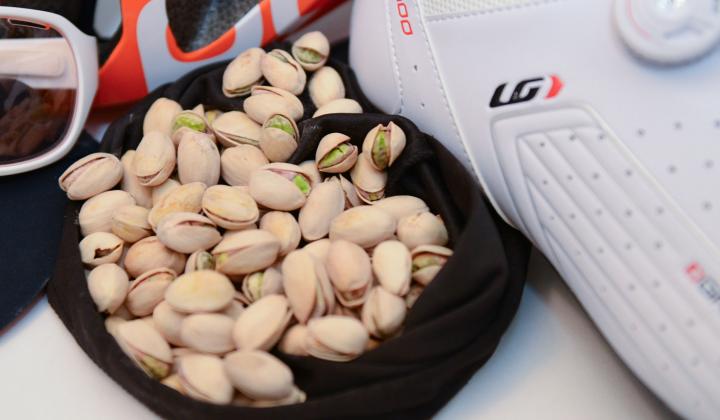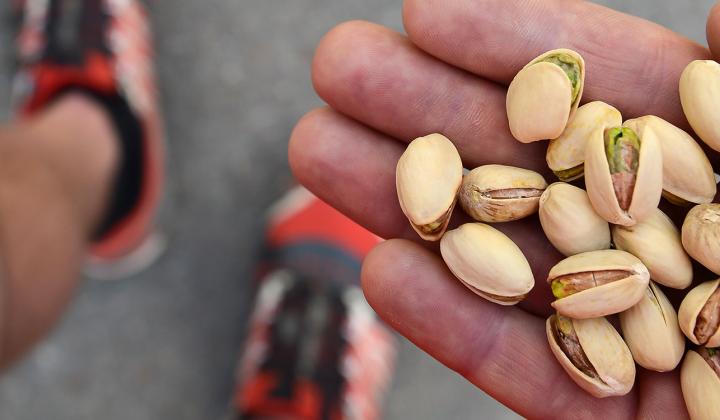Why We Should Love, Not Fear, Fats
Equally important to performance are fats. Although much demonized in the past, we now appreciate how important the right blend of fats in our diets is for health and performance. Like protein, there are considerations to be made to ensure we’re getting the fats we need when following a plant-based diet.
Apart from certain clinical issues, low-fat diets should be consigned to the history books, and this definitely applies to the diets of athletes. Fats don’t make us fat! Fats play a significant role in our bodies. Without them, good health and high performance is impossible.
Right from the membranes of our cells, the hormones that carry vital information to our bodies provide protection for our organs and serve as a key energy source that is essential for life. If we are actively restricting or avoiding them, we will almost certainly be limiting our performance and thus potentially damaging our health.
For athletes following a plant-based diet, it’s highly unlikely that there will be any issues with consuming too much fat. It is more likely that ensuring they’re taking in enough fat will be more pertinent.
Essential Fatty Acids
In the same way that proteins are composed of long chains of amino acids, and carbohydrates are chains of simple sugars, fats are assembled from their own building blocks, which are fatty acids. When we consume fat, enzymes known as lipases break the fats down into their constituent fatty acids, which can then be reassembled for use throughout the body.
Just like there are essential amino acids, there are also essential fatty acids (EFAs) that must be present in our diet because our bodies cannot produce them on their own. The two primary EFAs are known as linoleic acid (Omega-6) and alpha-linolenic acid (Omega-3). From these two EFAs, our bodies reassemble them to form every fat we require.
Omega-3 vs Omega-6
Choosing the fats we consume, especially for athletes, is important because of the effect it has on inflammation in the body. Often people talk about some oils, especially fish oils, as being anti-inflammatory, but this is a bit of a misunderstanding. The types of fats we consume are either more inflammatory or less inflammatory rather than actually being anti-inflammatory. If we consume more of the fats that are less inflammatory, there will be a lower degree of amplification of inflammation. Typically, Omega-3 fats will be less inflammatory and Omega-6 and saturated fats more inflammatory.
Due to the high proportion of processed vegetable oils in modern diets, which are very rich in Omega-6, the levels of inflammation in our bodies tend to be disproportionally high. It has been suggested that an ideal ratio would be 1:1, whereas, for many people, it is 1:20. To reduce Omega 6 intake, cook with olive or coconut oil rather than sunflower oil. Increase the Omega-3 intake to further improve the ratio and confer a number of benefits that are especially relevant to athletes.
Retain Lean Tissue
I brought fish oils into sports, from my clinical work. Cancer patients suffer from a stress-related muscle wastage known as cachexia, which is not just related to calorie deficiency, because even if they’re eating enough, it still happens. Fish oils, or more specifically the Omega-3 fatty acid Eicosapentenoic acid (EPA) can help to reduce this and may aid the retention of lean tissue. Hard training can be a similar stress on the body, and Omega-3 can perform the same function.
Increasing Omega-3 Intake on a Plant-Based Diet
Obviously, if we’re following a plant-based diet, then fish oil isn’t an option; however, it is still possible to get enough Omega-3, specifically EPA. All nutrients originally come from the sun and are simply passed up the food chain. Oily fish obtain their Omega-3 from eating krill which, in turn, get it from algae. In plant-based fat sources, the primary Omega-3 fatty acid is alpha-linoleic acid (ALA), but our bodies will readily convert ALA to EPA. There are now commercially available algae-based Omega-3 supplements, but there are plenty of other plant-based sources.
Nuts and Seeds
The number one recommendation for optimal fat intake on a plant-based diet are nuts and seeds. By regularly snacking on a wide variety of nuts and seeds, and using them in main meals and in dressings with their oils, we will ensure we’re getting the fats we need.
Seeds need to be milled in order for the body to fully digest and absorb the nutrients. Pistachios, like olive oil, primarily contain monounsaturated fat. The Dietary Guidelines for Americans recommend getting most of our fats from sources of polyunsaturated and monounsaturated fatty acids. The American Heart Association has accredited pistachios as meeting the criteria for a heart healthy food.
◄Go back to: The Plant-based Athlete













